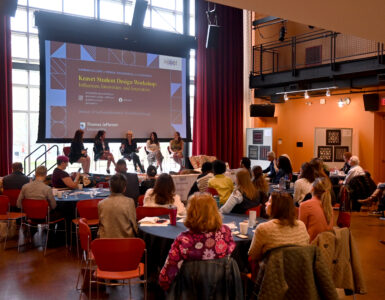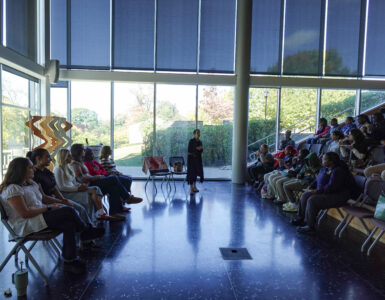On Tuesday, January 24th, students in PhilaU’s User Experience & Interaction Design program had the chance to attend a talk with John Maeda hosted by Drexel University’s ExCITe Center.
Maeda began his career studying software engineering at MIT and has moved through various positions in design and business. In 2007, he spoke at TED about “Designing for Simplicity,” a topic on which he had already written the book The Laws of Simplicity.
Currently, John Maeda is Global Head, Computational Design and Inclusion at Automattic, where he launched the site Design.blog that features articles contributed by other Automattic employees, who refer to themselves as Automatticians. In one of Maeda’s first posts on the site, he preaches the importance of coding knowledge and the ability that Open Source gives for a wide population outside of academia to obtain that knowledge.
For someone with as much acclaim as Maeda, he is incredibly down-to-earth. Before the presentation commenced, Maeda went up on stage to comment on how empty the first few rows were – “people pay thousands of dollars to sit in the front” – then proceeded to usher the incoming audience members into these seats, continuing even after Youngmoo Kim, the Director of the ExCITe Center, began the program. His presentation was casual. At the start, Maeda wrote his phone number at the top of the screen for the introverts in the crowd who wanted to participate in the Q&A session later without having to stand at the microphone.
During the presentation, Maeda conveyed the importance of training more artists and designers who can write code. The fight to intermingle these separate disciplines is one Maeda has fought for quite some time within the education system. Now, in his position at Automattic, Maeda is looking toward Open Source as an opportunity for an even wider, more diverse group of people (in all senses – race, gender, income, career background) to develop coding skills.
Maeda also spoke about the disruptions of hierarchical organizations that has come with emerging technology – citing smartphones specifically for revolutionizing on a massive scale the way people connect with one another for both personal and business reasons. This widespread use, Maeda said, has made the focus on design a necessity in our culture. However, with organizational structures shifting to allow quicker and more direct interaction with people at all levels and industries becoming a place for individuals to act as leaders themselves, now is as critical a time as ever for individuals to have the wide range of skills that come with a dual design and technology background. Even if the work you end up doing consists of only one or the other, having knowledge in both will allow you to better communicate with your peers.
Drexel’s ExCITe Center has graciously made the stream of the entire presentation and Q&A session available to watch on Youtube:
ExCITe Center’s next Learning Innovation presentation will happen March 21st, with Mizuko Ito discussing youth education and digital media.







Add comment